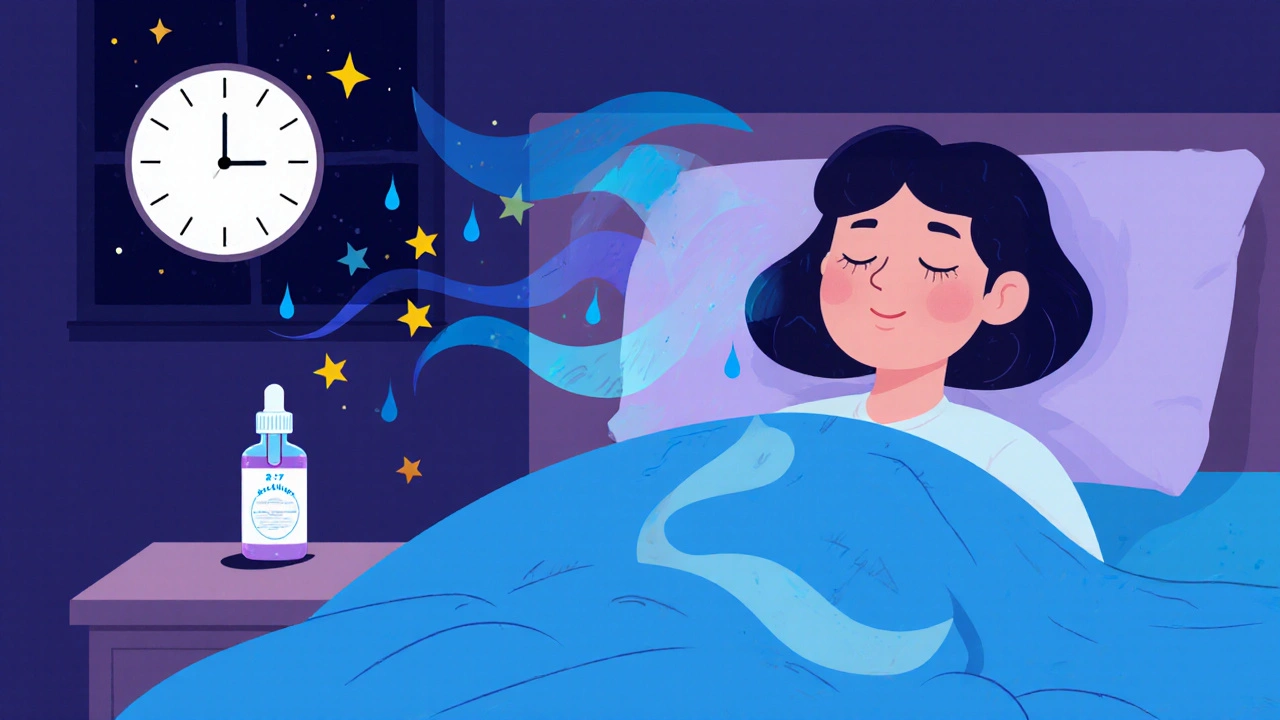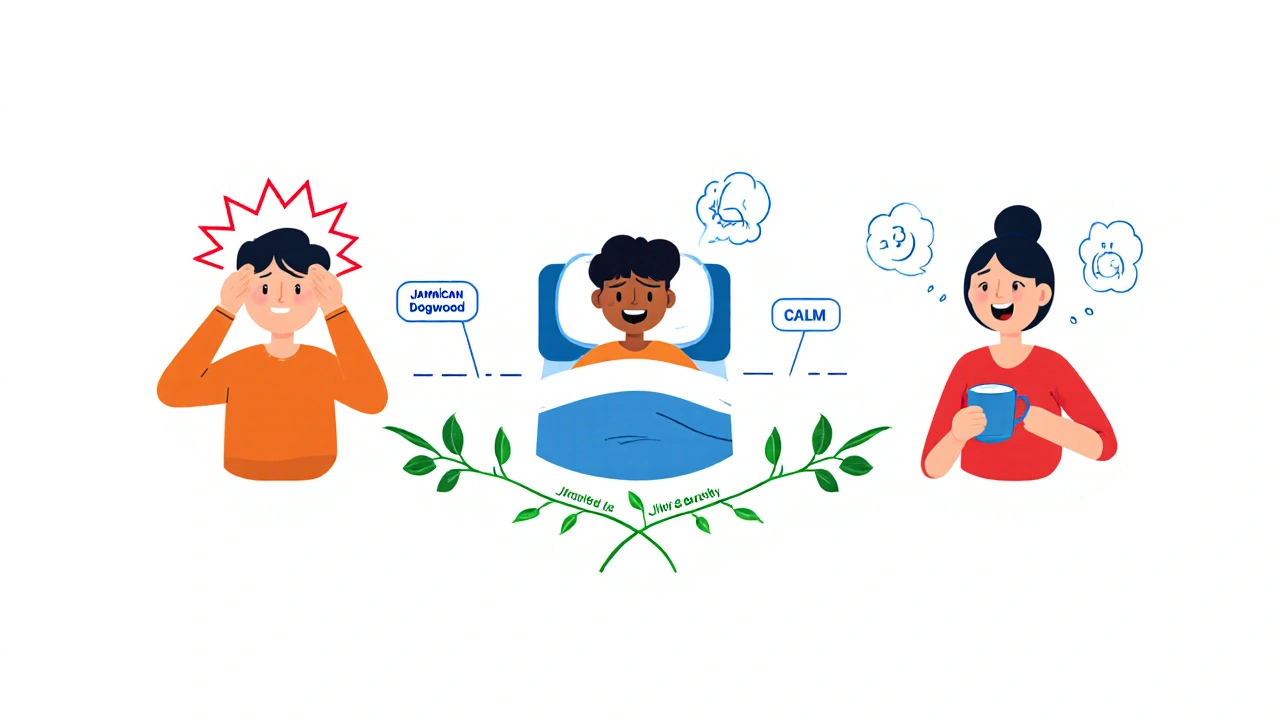Most people reach for painkillers or sleep aids without thinking about what’s really going on in their bodies. Chronic stress, muscle tension, and restless nights aren’t just annoyances-they’re signs your nervous system is stuck in overdrive. What if there was a quiet, time-tested herb that could help reset it? Enter Jamaican Dogwood.
What Exactly Is Jamaican Dogwood?
Jamaican Dogwood (Piscidia erythrina) isn’t your average tree. It’s a slow-growing, tropical plant native to the Caribbean, southern Florida, and parts of Central America. For centuries, indigenous communities used its bark and roots to ease pain, calm nerves, and help people sleep. Unlike synthetic drugs, it doesn’t knock you out or leave you groggy. Instead, it gently quiets the nervous system.
The active compounds-piscidic acid, isoflavonoids, and tannins-work together to reduce inflammation and modulate nerve signals. It’s not a miracle cure, but for people dealing with tension headaches, menstrual cramps, or nighttime anxiety, it’s one of the few herbal options with real, documented effects.
How Jamaican Dogwood Works on Your Body
Here’s the simple version: your body has two main systems for handling stress-the sympathetic (fight-or-flight) and parasympathetic (rest-and-digest). Modern life keeps the first one switched on too long. Jamaican Dogwood helps flip the switch back.
It doesn’t act like a sedative. It doesn’t depress your central nervous system. Instead, it interacts with GABA receptors-the same ones targeted by prescription anti-anxiety meds-but in a much milder, natural way. This means less risk of dependency and fewer side effects like dizziness or memory fog.
Studies from the University of the West Indies show it reduces muscle spasms and nerve pain in animal models. Human trials are limited, but anecdotal reports from herbalists across Jamaica, Florida, and Australia consistently mention improved sleep quality and reduced muscle tightness within 30 to 60 minutes of taking it.
Who Benefits Most from Jamaican Dogwood?
Not everyone needs this. But if you fit one of these profiles, it could be a game-changer:
- You get tension headaches 2-3 times a week, and ibuprofen barely helps.
- Your menstrual cramps are so bad you miss work or social plans.
- You lie awake at night replaying conversations or worrying about tomorrow.
- You’ve tried melatonin, valerian, or magnesium-and they didn’t do much.
- You’re tired of relying on prescription sleep aids or benzodiazepines.
One woman in Sydney, 52, started using Jamaican Dogwood tincture after years of migraines and insomnia. Within two weeks, her headaches dropped from daily to once a week. She stopped taking zolpidem. She didn’t feel ‘drugged’-just calmer, clearer, and more rested.

How to Take Jamaican Dogwood: Dosing and Forms
You won’t find it at your local supermarket. It’s sold as a tincture, capsule, or dried herb for tea. Here’s what works based on real user experience and herbalist guidelines:
- Tincture (alcohol-based): 15-30 drops under the tongue, up to 3 times a day. Best for acute pain or anxiety. Works in 20-40 minutes.
- Capsules: 300-500 mg, taken 1-2 times daily. Slower onset, better for long-term stress or sleep support.
- Tea: Steep 1 teaspoon of dried bark in hot water for 10 minutes. Mild effect-good for daily maintenance.
Start low. Take 15 drops or one capsule in the evening for the first 3 days. See how you feel before increasing. Don’t take it before driving or operating heavy machinery until you know how your body reacts.
What to Avoid: Safety and Side Effects
Jamaican Dogwood is generally safe for healthy adults-but it’s not for everyone.
- Don’t use if pregnant or breastfeeding. No reliable safety data exists.
- Don’t mix with alcohol, benzodiazepines, or sleeping pills. It can amplify their effects.
- Watch for nausea or drowsiness. A small percentage of users feel slightly queasy on an empty stomach.
- Stop 2 weeks before surgery. It may interact with anesthesia.
There’s no evidence of liver damage or long-term harm when used responsibly. But quality matters. Look for products labeled “organic,” “wild-harvested,” or “standardized extract.” Avoid cheap powders with fillers-those are often ineffective or contaminated.
How It Compares to Other Natural Remedies
Here’s how Jamaican Dogwood stacks up against common alternatives:
| Remedy | Best For | Onset Time | Duration | Dependency Risk |
|---|---|---|---|---|
| Jamaican Dogwood | Nerve pain, anxiety, muscle tension | 20-40 min | 4-6 hours | Very low |
| Valerian Root | Insomnia | 1-2 hours | 6-8 hours | Low |
| Melatonin | Jet lag, circadian rhythm | 30 min | 4-5 hours | None |
| Magnesium Glycinate | Stress, muscle cramps | 1-3 hours | 8+ hours | None |
| Kava | Anxiety | 15-30 min | 3-5 hours | Moderate (liver risk) |
Jamaican Dogwood fills a gap. It’s faster than valerian, more targeted than magnesium, and safer than kava. If you’ve tried the others and still feel wired or achy, this might be the missing piece.

Where to Find Quality Jamaican Dogwood
Not all supplements are created equal. In Australia, you’ll find it in a few trusted herbal apothecaries and online retailers specializing in ethnobotanicals. Look for:
- Products made from Piscidia erythrina bark or root (not leaves)
- Alcohol-based tinctures with 1:5 extraction ratio
- Third-party lab testing for heavy metals and pesticides
- Clear dosage instructions and expiration dates
Brands like Herb Pharm (USA), Gaia Herbs, and Australian-made options like Nature’s Way Herbal Solutions are reliable. Avoid Amazon or eBay sellers with no sourcing info. You’re buying a potent herb-don’t gamble with quality.
Realistic Expectations: What It Won’t Do
Jamaican Dogwood isn’t a magic bullet. It won’t:
- Cure chronic pain from arthritis or nerve damage
- Replace therapy for clinical anxiety or depression
- Fix poor sleep hygiene like screen time before bed
Think of it as a tool-not a solution. Pair it with deep breathing, a consistent bedtime, and reducing caffeine after noon. That’s when it shines.
One man in Brisbane used it for 6 months while recovering from a back injury. He didn’t stop his physical therapy. He didn’t quit his job. But he stopped waking up in pain. He slept through the night. And for the first time in years, he woke up without reaching for painkillers.
Final Thoughts: Is It Worth Trying?
If you’re tired of treating symptoms without addressing the root-nervous system overload-then yes. Jamaican Dogwood offers something rare: targeted, gentle, non-habit-forming relief. It’s not flashy. It doesn’t have celebrity endorsements. But it’s been used for generations because it works.
Start small. Track how you feel. Give it 2-3 weeks. If your headaches ease, your sleep improves, and your body feels less clenched, you’ve found something valuable.
Not everyone needs it. But for those who do, it’s one of the quietest, most effective tools in natural health.
Can Jamaican Dogwood help with migraines?
Yes, for some people. Jamaican Dogwood reduces muscle tension and nerve sensitivity, both common migraine triggers. It’s not a cure, but users report fewer and less intense attacks when taken at the first sign of pressure or aura. It works best as a preventive, not a rescue.
How long does it take to work for sleep?
Most people feel the calming effect within 30-45 minutes when taken as a tincture. For capsules, it may take 60-90 minutes. Consistent nightly use for 7-10 days often leads to deeper, more restful sleep-not just falling asleep faster.
Is Jamaican Dogwood legal in Australia?
Yes. It’s classified as a complementary medicine and is available without a prescription. As long as it’s sold by a TGA-listed supplier and meets labeling requirements, it’s legal to buy and use.
Can I take it with my antidepressants?
Not without talking to your doctor. While Jamaican Dogwood doesn’t directly interfere with SSRIs, it can enhance sedative effects. If you’re on medication for anxiety or depression, consult a healthcare provider before combining it with any herbal remedy.
Does it cause liver damage like kava?
No known cases of liver toxicity have been linked to Jamaican Dogwood in over 100 years of documented use. Unlike kava, which contains hepatotoxic compounds, Jamaican Dogwood’s active ingredients are not metabolized in a way that stresses the liver. Still, avoid long-term daily use without breaks.


Post A Comment